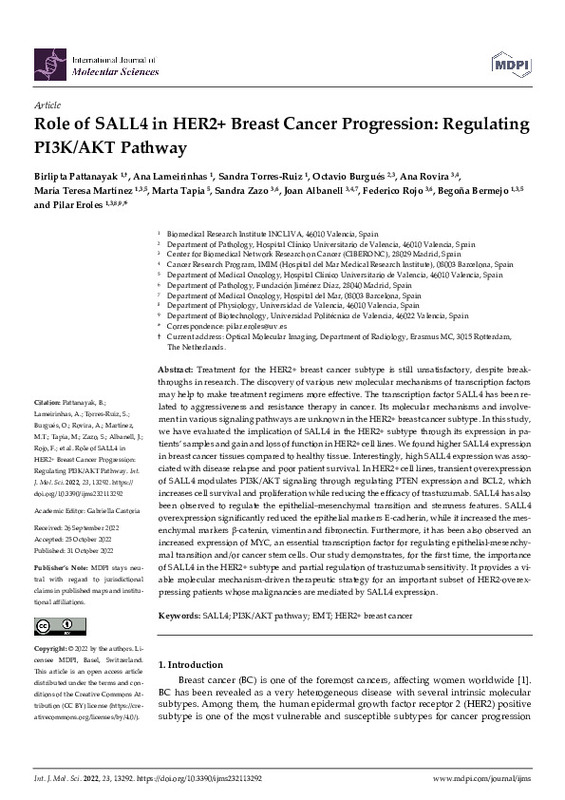JavaScript is disabled for your browser. Some features of this site may not work without it.
Buscar en RiuNet
Listar
Mi cuenta
Estadísticas
Ayuda RiuNet
Admin. UPV
Role of SALL4 in HER2+Breast Cancer Progression: Regulating PI3K/AKT Pathway
Mostrar el registro sencillo del ítem
Ficheros en el ítem
| dc.contributor.author | Pattanayak, Birlipta
|
es_ES |
| dc.contributor.author | Trigo-Lameirinhas, Ana Catarina
|
es_ES |
| dc.contributor.author | Torres-Ruiz, Sandra
|
es_ES |
| dc.contributor.author | Burgués, Octavio
|
es_ES |
| dc.contributor.author | AURA ROVIRA, ANA MARÍA
|
es_ES |
| dc.contributor.author | Martínez, Maite
|
es_ES |
| dc.contributor.author | Tapia, Marta
|
es_ES |
| dc.contributor.author | Zazo, Sandra
|
es_ES |
| dc.contributor.author | Albanell, Joan
|
es_ES |
| dc.contributor.author | Rojo, Federico
|
es_ES |
| dc.contributor.author | Bermejo, Begoña
|
es_ES |
| dc.contributor.author | Eroles-Asensio, Pilar
|
es_ES |
| dc.date.accessioned | 2024-03-01T19:01:25Z | |
| dc.date.available | 2024-03-01T19:01:25Z | |
| dc.date.issued | 2022-10-31 | es_ES |
| dc.identifier.uri | http://hdl.handle.net/10251/202884 | |
| dc.description.abstract | [EN] Treatment for the HER2+ breast cancer subtype is still unsatisfactory, despite breakthroughs in research. The discovery of various new molecular mechanisms of transcription factors may help to make treatment regimens more effective. The transcription factor SALL4 has been related to aggressiveness and resistance therapy in cancer. Its molecular mechanisms and involvement in various signaling pathways are unknown in the HER2+ breast cancer subtype. In this study, we have evaluated the implication of SALL4 in the HER2+ subtype through its expression in patients' samples and gain and loss of function in HER2+ cell lines. We found higher SALL4 expression in breast cancer tissues compared to healthy tissue. Interestingly, high SALL4 expression was associated with disease relapse and poor patient survival. In HER2+ cell lines, transient overexpression of SALL4 modulates PI3K/AKT signaling through regulating PTEN expression and BCL2, which increases cell survival and proliferation while reducing the efficacy of trastuzumab. SALL4 has also been observed to regulate the epithelial-mesenchymal transition and stemness features. SALL4 overexpression significantly reduced the epithelial markers E-cadherin, while it increased the mesenchymal markers beta-catenin, vimentin and fibronectin. Furthermore, it has been also observed an increased expression of MYC, an essential transcription factor for regulating epithelial-mesenchymal transition and/or cancer stem cells. Our study demonstrates, for the first time, the importance of SALL4 in the HER2+ subtype and partial regulation of trastuzumab sensitivity. It provides a viable molecular mechanism-driven therapeutic strategy for an important subset of HER2-overexpressing patients whose malignancies are mediated by SALL4 expression. | es_ES |
| dc.description.sponsorship | We thank the patients who have agreed to participate in this study. We want to particularly acknowledge the INCLIVA BioBank (PT17/0015/0049; B.000768 ISCIII//) integrated in the Valencian Biobanking Network and the Spanish National Biobanks Network for its collaboration. We also express our gratitude to associations, individuals, and entities that collaborate with our research in breast cancer. | es_ES |
| dc.language | Inglés | es_ES |
| dc.publisher | MDPI AG | es_ES |
| dc.relation.ispartof | International Journal of Molecular Sciences | es_ES |
| dc.rights | Reconocimiento (by) | es_ES |
| dc.subject | SALL4 | es_ES |
| dc.subject | PI3K/AKT pathway | es_ES |
| dc.subject | EMT | es_ES |
| dc.subject | HER2+ breast cancer | es_ES |
| dc.title | Role of SALL4 in HER2+Breast Cancer Progression: Regulating PI3K/AKT Pathway | es_ES |
| dc.type | Artículo | es_ES |
| dc.identifier.doi | 10.3390/ijms232113292 | es_ES |
| dc.relation.projectID | info:eu-repo/grantAgreement/ISCIII//B.000768/ | es_ES |
| dc.relation.projectID | info:eu-repo/grantAgreement/Instituto de Investigación Sanitaria INCLIVA//PT17%2F0015%2F0049//Control de Calidad de Muestras de la Red Nacional de Biobancos 2020/ | es_ES |
| dc.rights.accessRights | Abierto | es_ES |
| dc.description.bibliographicCitation | Pattanayak, B.; Trigo-Lameirinhas, AC.; Torres-Ruiz, S.; Burgués, O.; Aura Rovira, AM.; Martínez, M.; Tapia, M.... (2022). Role of SALL4 in HER2+Breast Cancer Progression: Regulating PI3K/AKT Pathway. International Journal of Molecular Sciences. 23(21):1-16. https://doi.org/10.3390/ijms232113292 | es_ES |
| dc.description.accrualMethod | S | es_ES |
| dc.relation.publisherversion | https://doi.org/10.3390/ijms232113292 | es_ES |
| dc.description.upvformatpinicio | 1 | es_ES |
| dc.description.upvformatpfin | 16 | es_ES |
| dc.type.version | info:eu-repo/semantics/publishedVersion | es_ES |
| dc.description.volume | 23 | es_ES |
| dc.description.issue | 21 | es_ES |
| dc.identifier.eissn | 1422-0067 | es_ES |
| dc.identifier.pmid | 36362083 | es_ES |
| dc.identifier.pmcid | PMC9655635 | es_ES |
| dc.relation.pasarela | S\476246 | es_ES |
| dc.contributor.funder | Instituto de Salud Carlos III | es_ES |
| dc.contributor.funder | Instituto de Investigación Sanitaria INCLIVA | es_ES |








